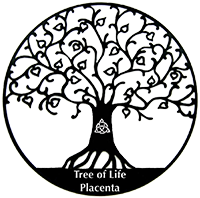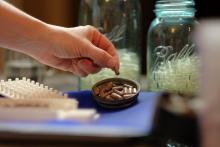Do you want to lessen the baby blues during your postpartum time?
The placenta contains your own natural hormones and is perfectly made for you, by you. Experts agree that the placenta retains hormones. Reintroducing them to your system is believed to ease postpartum and menopausal hormonal fluctuations.
Why should I take placenta capsules?
Your baby's placenta, contained in capsule form, is believed to, contain your own natural hormones, be perfectly made for you, balance your system, replenish depleted iron, give you more energy, lessen bleeding postnatal, been shown to increase milk production, help you have a happier postpartum period, speeds up the return of uterus to pre-pregnancy state, and be helpful during menopause. So I ask, Why not?
Important Facts:
Eighty percent of women experience some sort of postnatal mood disorder, the mildest of which is called the "baby blues". Symptoms of the baby blues include weepiness, sadness and anxiety, and these negative emotions can last for the first several weeks of the new baby's life. With proper preparation, the majority of women can avoid the baby blues.
During a normal vaginal delivery a new mother will lose at least one eighth to one tenth of her body's blood supply, with cesarean section births blood loss can be significantly more. Losing a large amount iron so quickly can cause anemia, leaving a new mum feeling tired, faint and exhausted. The blood needs high supplies of iron to carry oxygen to the cells - low supplies of oxygen leave your cells starving and less able to heal after trauma. The placenta benefits the new mother by supplying incredibly rich meaty iron, amino acids and essential fats which we believe is the be the perfect replenishment following the ordeal of birth.
The most important nutrients found in rich supply in the placenta include:
- Iron - essential for oxygen absorbtion in the cells
- vitamins B6 - aids in the making of antibodies
- Vitamin E - for healing damaged skin cells
- Oxytocin hormone - essential for facilitating birth and breastfeeding, for pain and bonding; produced during breastfeeding to facilitate bonding of mother and infant. In pharmaceutical form this is a very addictive drug because it promotes a feeling of connectedness with others and is often referred to as the “love” hormone.
- Corticotropin-releasing hormone (CRH) - responsible for reducing stress levels
- Cytokins - Fibroblasts that trigger cell metabolism healing and replacing damaged cells and tissue
- Gonadotrophin - the precursor to estrogen, progesterone and testosterone
- Prolactin - promotes lactation
- Interferon - stimulates the immune system to protect against infection
- Thyroid Stimulating Hormone - boosts energy and helps recover from stressful events
- Cortisone - combats stress and unlocks stores of energy
- Prostaglandins - anti-inflammatory
- Hemoglobin - replenishes iron deficiency and anemia
- Gammaglobulin - immune booster that helps protect against postpartum infections-
- Urokinase Inhibiting Factor & Factor XIII - stops bleeding and enhances wound healing


